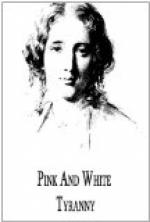This winter Harry Endicott suddenly returned to the fashionable circles of New York,—returned from a successful career in India, with an ample fortune. He was handsomer than ever, took stylish bachelor lodgings, set up a most distracting turnout, and became a sort of Marquis of Farintosh in fashionable circles. Was ever any thing so lucky, or so unlucky, for our Lillie?—lucky, if life really does run on the basis of French novels, and if all that is needed is the sparkle and stimulus of new emotions; unlucky, nay, even gravely terrible, if life really is established on a basis of moral responsibility, and dogged by the fatal necessity that “whatsoever man or woman soweth, that shall he or she also reap.”
In the most critical hour of her youth, when love was sent to her heart like an angel, to beguile her from selfishness, and make self-denial easy, Lillie’s pretty little right hand had sowed to the world and the flesh; and of that sowing she was now to reap all the disquiets, the vexations, the tremors, that go to fill the pages of French novels,—records of women who marry where they cannot love, to serve the purposes of selfishness and ambition, and then make up for it by loving where they cannot marry. If all the women in America who have practised, and are practising, this species of moral agriculture should stand forth together, it would be seen that it is not for nothing that France has been called the society educator of the world.
The apartments of the Follingsbee mansion, with their dreamy voluptuousness, were eminently adapted to be the background and scenery of a dramatic performance of this kind. There were vistas of drawing-rooms, with delicious boudoirs, like side chapels in a temple of Venus, with handsome Charlie Ferrola gliding in and out, or lecturing dreamily from the corner of some sofa on the last most important crinkle of the artistic rose-leaf, demonstrating conclusively that beauty was the only true morality, and that there was no sin but bad taste; and that nobody knew what good taste was but himself and his clique. There was the discussion, far from edifying, of modern improved theories of society, seen from an improved philosophic point of view; of all the peculiar wants and needs of etherealized beings, who have been refined and cultivated till it is the most difficult problem in the world to keep them comfortable, while there still remains the most imperative necessity that they should be made happy, though the whole universe were to be torn down and made over to effect it.
The idea of not being happy, and in all respects as blissful as they could possibly be made, was one always assumed by the Follingsbee clique as an injustice to be wrestled with. Anybody that did not affect them agreeably, that jarred on their nerves, or interrupted the delicious reveries of existence with the sharp saw-setting of commonplace realities, in their view ought to be got rid of summarily, whether that somebody were husband or wife, parent or child.




